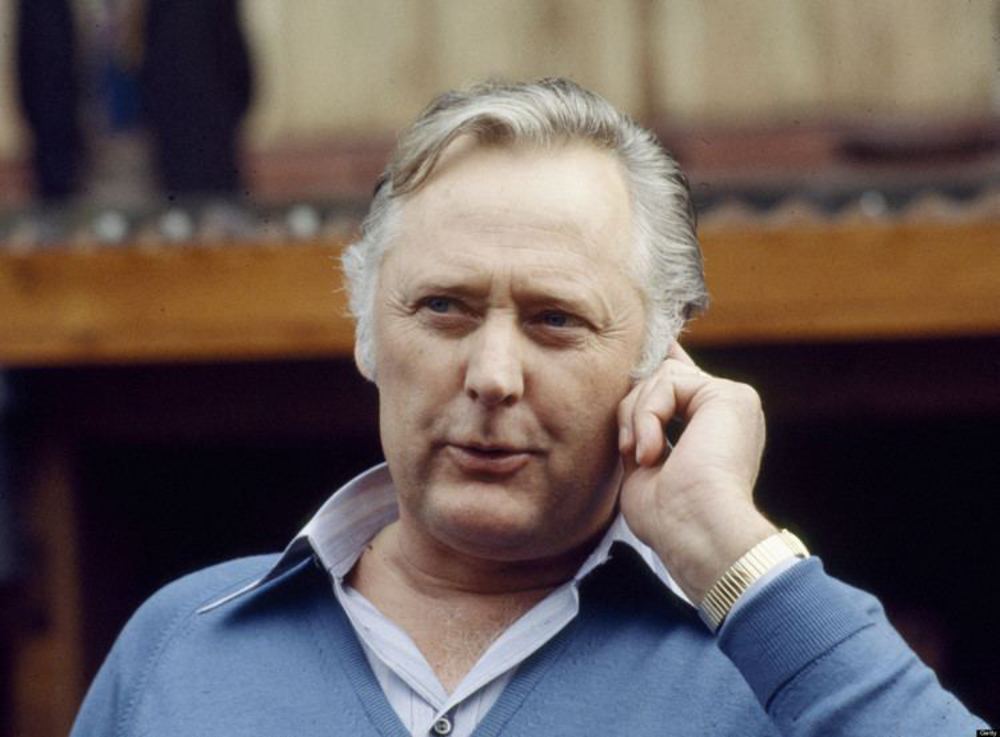
Peter Taylor
Burton Albion have been a Football League club now since 2009 when they won the Football Conference title by two points in front of second-placed Cambridge United.
However, they spent 35 years as members of the Southern Football League.
Because of their geographic location, the Brewers were shifted north to the Northern Premier League from 1979 to 1987 and again in 2001/02.
It was 1958 when the Brewers made the switch from the Birmingham League to the Southern League and also moved grounds from Wellington Street to Eton Park on the opposite side of the town.
The club struggled in the Southern League under former Derby County favourite Jackie Stamps, finishing bottom in their first season and generally struggling in the lower reaches of the league.
Cup success continued for the club as they became the first side from outside of the Premier Division to win the Southern League Cup when they beat Weymouth 5-2 on aggregate in 1964.
The manager at that time was PETER TAYLOR, who had joined Burton as a goalkeeper in May 1962.
Taylor, then 34, had made over 200 League appearances for Coventry City and Middlesbrough.
He was appointed as manager in October 1962 after impressing the chairman with his knowledge of the game.
Taylor helped stabilise the Brewers in the Southern League and after eighth and tenth-placed finishes, he left Eton Park to join his former Middlesbrough team-mate Brian Clough at Fourth Division Hartlepool United and the rest – as they say – is history!
The duo went on to become one of the best managerial partnerships in the English game.
Ironically, the man who replaced Taylor at Burton, ex-Bristol City forward Alex Tait, led the Brewers to promotion to the Premier Division as player-manager in his first season in charge!
The Brewers won promotion to the Southern League Premier Division on three occasions but also suffered relegation from the top division the same number of times as the club sought stability in the upper echelons of non-League football.
The Brewers were agonisingly close to a Wembley appearance when they suffered semi-final heartbreak in the FA Trophy to Matlock Town in 1975.
The club also enjoyed the skills of former Nottingham Forest, Manchester United and England winger IAN STOREY-MOORE in 1974 and 1975 – just after retiring from full-time injury whilst at United - and he was persuaded to return in 1978 as player-manager, overseeing the Brewers move from the Southern League to the Northern Premier League for the first time in 1979 as non-League football underwent significant change with the advent of the Alliance Premier League.
Storey-Moore was succeeded in 1981 by another player-manager – a certain Neil Warnock!
In 2001, after eight years in the Northern Premier League, the Brewers reverted to the Southern League as part of a geographical balancing exercise.
Initial lofty expectations were soon dampened as the club struggled to adapt costing Warnock`s successor, Brian Fidler, his job.
Managers such as Sunderland FA Cup winner Vic Halom, ex-Scottish international Bobby Hope and former Derby midfielder Steve Powell came and went but none could deliver the long-awaited first league championship the club craved.
There was a Wembley visit in that period, however, as Fidler, who played in the very first FA Trophy Final for Macclesfield Town, returned to lead the Brewers to the Twin Towers to play Conference side Kidderminster Harriers, who took two attempts to beat Burton in a replay at West Bromwich Albion.
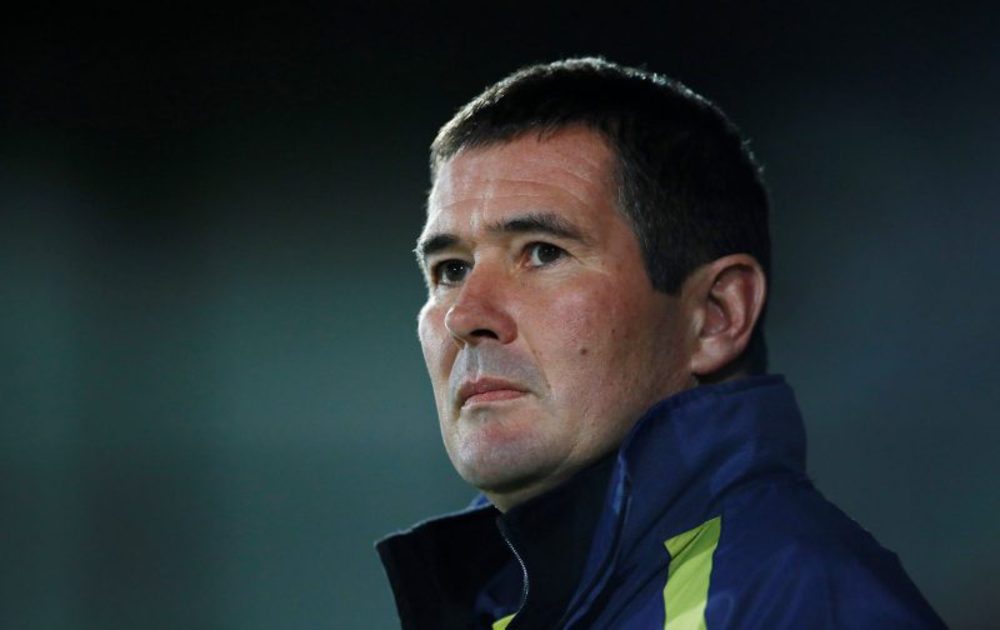
Former Everton and Derby defender John Barton delivered a Southern League Cup and Birmingham Senior Cup `double` in 1997 but he left the club in September 1998 after a disappointing start to the campaign to be replaced the following month by NIGEL CLOUGH (right), who proved to be the most successful manager in the club’s history.
Nigel, son of the legendary former Derby County and Nottingham Forest manager, took over in October 1998 and brought in former Forest team-mate Gary Crosby as his assistant and between them, they set about realising the untapped potential of the club.
After struggling in the remainder of the 1998/99 season there followed a period of continual improvement that saw the club finish as runners-up in the Southern Premier Division in successive seasons, just missing out on promotion to the Conference.
Another geographical alignment of the feeder leagues saw Burton return to the Northern Premier League in 2001 but this time it was only a one-season stay as Clough’s team swept all before them winning the first league championship in the clubs 52-year history.
A league-record number of points were gained, over 100 goals scored and just 30 conceded as Burton, at last, achieved their goal of Conference football.
There was even time for another run to the FA Trophy semi-finals where eventual winners Yeovil Town crushed dreams of an incredible double.
Margate`s first Southern League success came in 1935/36 when they were Eastern Section champions and then won the overall title after beating Western Section winners Plymouth Argyle reserves 3-1 in play-off.
Fielding a `second` team in the Southern League Central Section, they also claimed that title as well.
All this came a year after a controversial link-up with First Division giants Arsenal when Margate became the Gunners` nursery (reserve) side.
Margate`s neighbours Northfleet United (Gravesend) had a similar arrangement with Tottenham Hotspur at the time.
As well as sending young players to play for Margate, Arsenal also provided a manager, JIMMY RAMSAY, and a coach, Willie Arbuckle, who had previously been coach of the Great Britain Olympic team.
Arsenal paid their wages and 60% of the players` wages, which must have been a tremendous help to a non-League club.
The 1935/36 season proved to be one of the most successful in the club`s history.
Two players who were in Arsenal`s 1930 FA Cup Final team, goalkeeper Charlie Preedy and centre-forward Jack Lambert, were signed and they achieved an almost perfect league season and also had a run to the Third Round of the FA Cup after wins over Wimbledon, Queens Park Rangers and Crystal Palace before losing 3-1 to Blackpool.
Surprisingly, in January 1936, halfway through their hugely successful campaign in which Margate ended up winning four of the five competitions they entered, manager Jimmy Ramsay resigned, and captain Jack Lambert took over as player-manager and finished off the job.
Forward to 1950 and Margate – then in the Kent League - appointed former Tottenham, Southend United and West Ham United inside forward ALMER HALL as player-manager.
He was 37 at the time of his appointment but still went on to play until 1953 and score 36 goals in 67 games for Gate!
A clever player, he went on to become almost a part of the furniture with Margate.
He eventually vacated his post TWENTY years later.
He maintained a good relationship with West Ham and signed a host of former Hammers, including Alan Blackburn, keepers Stan Earl and Peter Chiswick, David Hills, Fred Kearns, Albert Foan and Ken Tucker.
He led Margate to a host of regional cup finals, as well as taking them into the rounds proper of the FA Cup on eleven occasions.
It was a mixed bag for Hall in the Southern League though after they moved back into the competition in 1960, winning promotion from Division One in 1962/63, being relegated in 1965/66, gaining an immediate return the season afterwards.
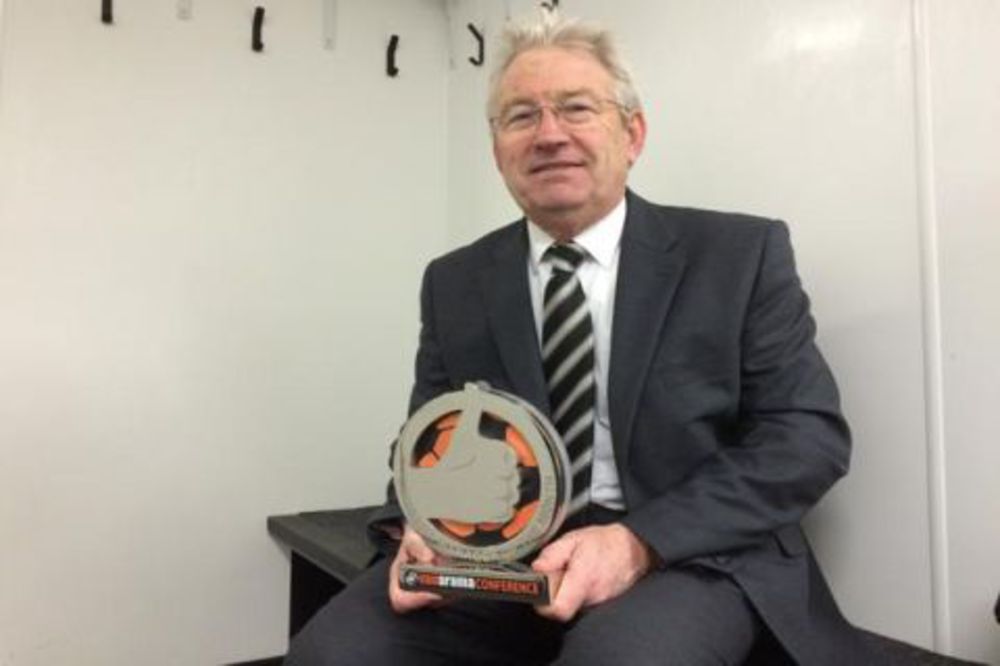
In 1996, Margate appointed former Dover Athletic boss CHRIS KINNEAR (right) as their new manager, and it came at a time when the club were gaining public attention after Bad Manners pop star Buster Bloodvessel got involved and the band`s name was on the first team shirts!
Kinnear led Margate to fifth place in the Southern Division and then in 1997/98 they finished sixth but won the League Cup and Kent Senior Cup.
They also attracted Sky TV cameras for their FA Cup tie with Fulham, who had just been taken over by Mohammed Al Fayed but, despite taking the lead, the Cottagers won 2-1 in front of 5,100 at Hartsdown Park.
The following season saw Kinnear guide the club out of the Southern section and back to the Premier Division for the first time in almost 20 years.
It almost didn`t happen though due to ground improvements being delayed. But an appeal to the FA saw Margate claim their place in the Premier Division.
After a third-place finish in 1999/2000, the following campaign saw Gate win the Premier Division title for the first time, and work on the ground at considerable cost, meant they gained a place in the Football Conference.
The first manager Headington United appointed soon after the club turned professional in 1949 was HARRY THOMPSON.
Thompson was a former Wolverhampton Wanderers and Sunderland first-team player who was yet another to have his prime years robbed by the Second World War.
He brought success to the club as it won the rare `double` of Southern League championship and League Cup in 1952/53 and the U's were clearly one of the best (if not the best) non-League clubs in the country at the time.
This was confirmed the following season when they reached the Fourth Round Proper of the FA Cup and beat Stockport County and Millwall in Manor Park replays before bowing out 4-2 at home to Bolton Wanderers, who were cup holders at the time.
Thompson`s side also retained the Southern League Cup.
Despite United ending in ninth place in both 1957 and 1958, the ambitious Board of Directors sacked the 43-year-old Thompson in November 1958.
He continued to live in Oxford until his death in early 2000.
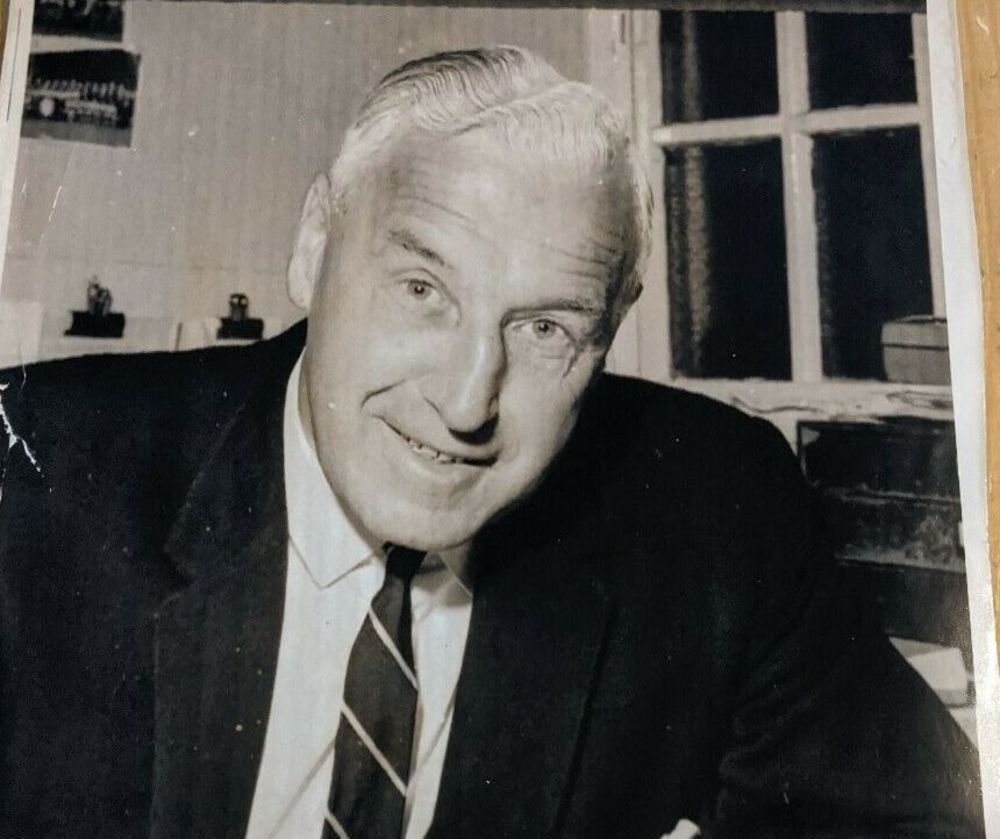
In 1958, Thompson was replaced by ARTHUR TURNER (left), who would become the longest-serving manager in the club's history, serving more than a decade in charge.
Turner led United to back-to-back Southern League titles, of which the second, in 1962, resulted in their election to the Football League.
Potteries born Turner was a forceful skipper with a First Division Stoke City team which included a young Stanley Matthews.
He was transferred to Birmingham City just prior to the war and returned to play at the age of 37 in the FA Cup semi-final of 1946.
Nearing 39, he became Southport's player-manager before managing Crewe.
He returned to Stoke as assistant manager before in November 1954, again moving from there to St Andrew's, this time to become the Blues` manager.
He led them to the old Second Division title in his first season and to their highest ever league position the following term when they ended just four points adrift of the country's second-best club.
Turner was the first manager to take an English club side into European competition when City reached the semi-final of the forerunner of the UEFA Cup - the Fairs Cup. He also took them to the 1956 FA Cup Final – the infamous final against Manchester City during which their German goalkeeper Bert Trautmann played on, despite a broken neck.
Despite presiding over the Blues' still best-ever spell, Turner resigned at the end of 1958.
He moved to Headington without signing a contract in January 1959. A few months later, top-flight Leeds United offered him the manager's job, but staggeringly, United matched their salary offer and retained Turner's services.
He brought in many young players from top clubs. Among these were the men on whom United's rapid rise would depend. These included the Atkinson brothers Ron and Graham.
With Turner in charge, United changed their name to Oxford United, won consecutive Southern League titles and entered the Football League all in little over three years.
Wellington Town, who became Telford United in 1969, first joined the Southern League`s North Western Division in 1958, having previously been in the Shropshire, Birmingham and Cheshire Leagues.
They spent only one season in the North-Western section before they became members of the Southern Premier Division.
And it was there they remained, unspectacularly, until 1969 when a change of name to Telford United helped boost their fortunes.
The name change came about because of a Government decision to set up a new town to cater for West Midland`s overspill centred on Dawley but encompassing the surrounding area, including Wellington.
The whole area was to be called Telford after the famous engineer and bridge builder.
Before eventually becoming founder members of the new Alliance Premier League, Wellington/Telford was one of only four clubs to have retained membership of the Southern Premier Division – the others being Weymouth, Chelmsford City and Yeovil Town.
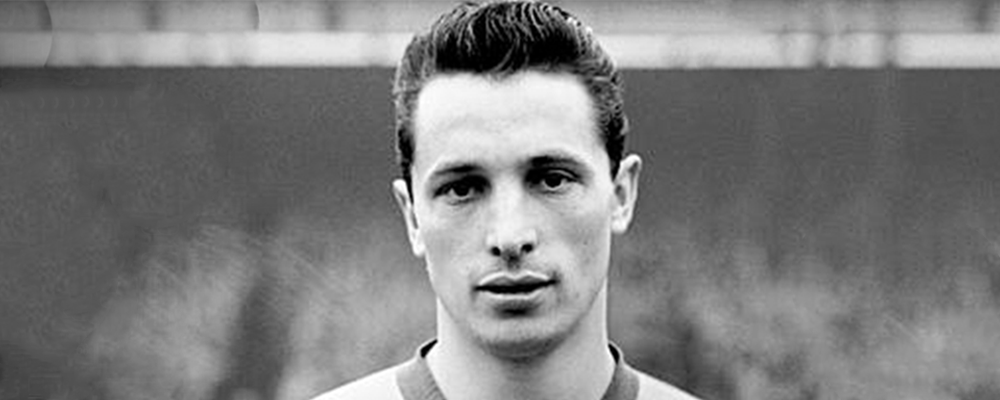
GRENVILLE HAIR (right) was good enough to play for Leeds United.
He rose through the ranks before playing 474 times for the first team, putting him 12th on the club’s all-time list of appearances.
Signed on the same day as John Charles in 1948, Major Frank Buckley would persuade Hair to concentrate on football rather than athletics, for which he was making a name for himself as a local champion.
After waiting two years to make his first appearance, Hair became an ever-present in the side for ten years, featuring under six managers, and staying long enough to be part of the opening seasons in the Don Revie `revolution`.
During his time at the club, Hair helped the club win promotion to the First Division in 1955/56.
He only lost his slot on the left side of the defence when Willie Bell arrived at Elland Road but by then Hair had had a fine career and was often picked to travel on FA tours but never won an England cap due to the likes of Ray Wilson who was ahead of him in the pecking order.
Such was his standing at both Leeds and in the game, for his testimonial, a Leeds United side played against the Grenville Hair XI, which featured Gordon Banks (Leicester), Nat Lofthouse (Bolton) and Jackie Milburn (Newcastle), amongst others.
On leaving the club in 1964, Hair took up the player-manager position at Wellington where he stayed for three years with a best performance being seventh in his final season before returning to Yorkshire.
He became a coach at Bradford City before eventually being promoted to manager. Whilst enjoying an upturn in results, Hair would sadly suffer a heart attack during a training session, dying at the age of just 36.
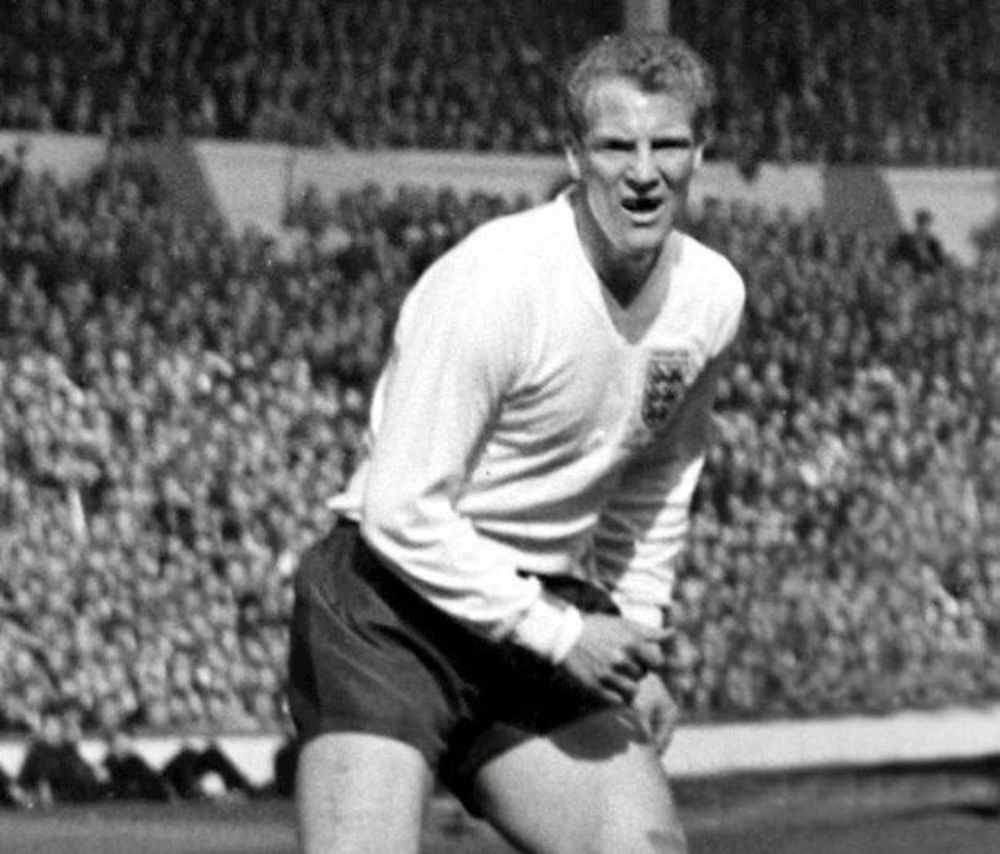
RON FLOWERS (left) was one of Hair`s successors as manager at the Bucks Head.
Flowers was a renowned and respected name in the game, having played over 500 times for Wolverhampton Wanderers during their halcyon days and winning 49 caps for England and being a member of the 1966 World Cup-winning squad, although he didn`t get on the field during the tournament.
After leaving Wolves, Flowers took over as player-manager of Northampton Town in 1967 and after two seasons with the Cobblers, adding a further 62 games to his League tally, he intended to give up football.
However, he was persuaded to join Telford United as player-manager in 1969.
One of Flowers` first tasks in charge of the Bucks was to sign his former Wolves team-mate Jimmy Murray from Walsall.
Murray played alongside Flowers in the 1960 FA Cup-winning side and the pair helped Telford to reach the first-ever FA Trophy Final at Wembley in 1970.
However, goals from David Lyon and Brian Fidler sealed a 2-0 win for Northern Premier League side Macclesfield Town in a game that had a rarity of opposing player-managers – Frank Beaumont being the Silkmen`s boss at the time.
Flowers and Telford won through to a second successive Trophy final in 1971 and this time triumphed by the odd goal in five against Southern League rivals Hillingdon Borough.
Flowers had by now hung up his boots and his place at Wembley went to a younger Graham Carr!
I saw Telford several times in the late 1960s and early 70s and was always surprised how poorly they seemed to do in the bread and butter of the league – never finishing above sixth until the final season before the formation of the Alliance Premier League when they ended in third spot behind Worcester City and Kettering Town.
But the Bucks always were - and have remained - a team to avoid in one-off cup games.

Most clubs are looking for volunteers. Find out more on the button below:
www.PitchingInVolunteers.co.ukAll the news and results in one place.
REGISTER